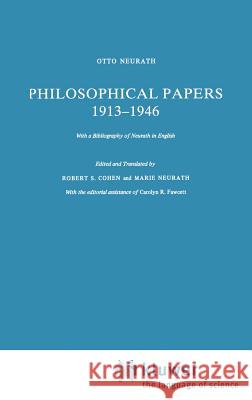Philosophical Papers 1913-1946: With a Bibliography of Neurath in English » książka
Philosophical Papers 1913-1946: With a Bibliography of Neurath in English
ISBN-13: 9789027714831 / Angielski / Twarda / 1983 / 268 str.
Philosophical Papers 1913-1946: With a Bibliography of Neurath in English
ISBN-13: 9789027714831 / Angielski / Twarda / 1983 / 268 str.
(netto: 1076,00 VAT: 5%)
Najniższa cena z 30 dni: 963,86
ok. 22 dni roboczych
Bez gwarancji dostawy przed świętami
Darmowa dostawa!
The philosophical writings of Otto Neurath, and their central themes, have been described many times, by Carnap in his authobiographical essay, by Ayer and Morris and Kraft decades ago, by Haller and Hegselmann and Nemeth and others in recent years. How extraordinary Neurath's insights were, even when they perhaps were more to be seen as conjectures, aperfus, philosophical hypotheses, tools to be taken up and used in the practical workshop of life; and how prescient he was. A few examples may be helpful: (1) Neurath's 1912 lecture on the conceptual critique of the idea of a pleasure maximum ON 50] substantially anticipates the development of aspects of analytical ethics in mid-century. (2) Neurath's 1915 paper on alternative hypotheses, and systems of hypotheses, within the science of physical optics ON 81] gives a lucid account of the historically-developed clashing theories of light, their un realized further possibilities, and the implied contingencies of theory survival in science, all within his framework that antedates not only the quite similar work of Kuhn so many years later but also of the Vienna Circle too. (3) Neurath's subsequent paper of 1916 investigates the inadequacies of various attempts to classify systems of hypotheses ON 82, and this volume], and sets forth a pioneering conception of the metatheoretical task of scientific philosophy.











